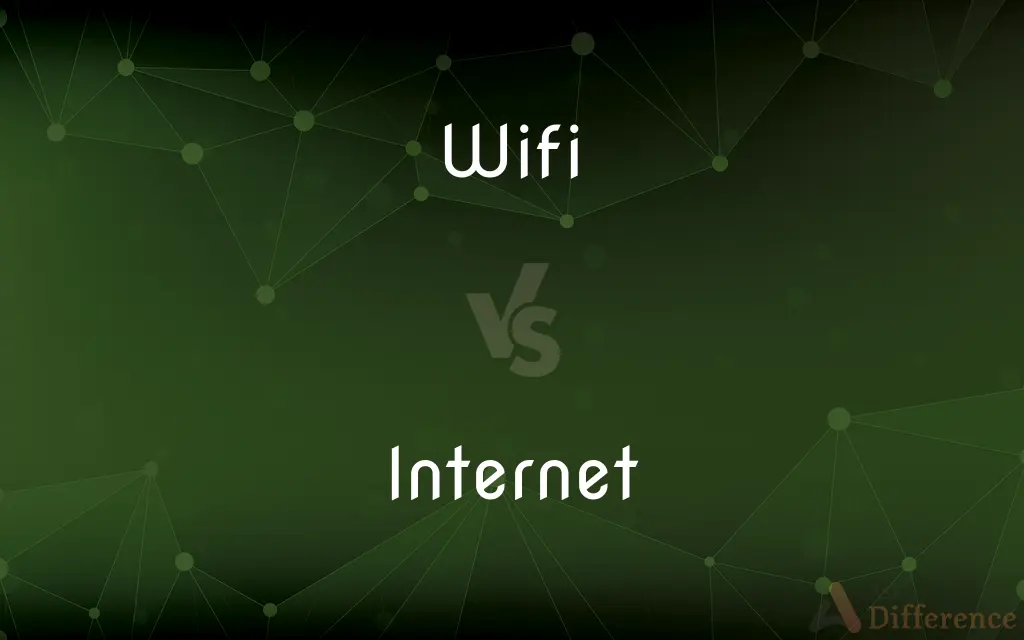Wifi vs. Internet — What's the Difference?
By Maham Liaqat & Urooj Arif — Published on September 30, 2024
Wifi is a wireless networking technology for devices to connect locally, whereas the Internet is a vast network of networks enabling global communication.

Difference Between Wifi and Internet
Table of Contents
ADVERTISEMENT
Key Differences
WiFi refers to a wireless networking technology that allows computers, smartphones, and other devices to communicate over a short distance without physical connections. It uses radio waves to provide wireless high-speed Internet and network connections. On the other hand, the Internet is a global system of interconnected computer networks that uses the standard Internet protocol suite (TCP/IP) to serve billions of users worldwide.
While WiFi facilitates local area networking (LAN) by providing a wireless connection to a router that grants Internet access, the Internet itself is an immense network that connects these local networks to each other, enabling data exchange across the world. Whereas WiFi is confined to a specific geographical area, typically extending to a few hundred feet, the Internet spans the entire globe, connecting multiple WiFi and other types of networks together.
WiFi operates on various standards, primarily defined by the IEEE 802.11 family, which includes 802.11a, b, g, n, ac, and ax, each offering different speeds and frequencies. The Internet's operation, however, relies on a complex architecture of physical and digital infrastructure, including undersea cables, satellites, and a vast array of servers and data centers across the world.
Security measures for WiFi networks include WEP, WPA, and WPA2, which protect the communication over wireless networks. The Internet’s security, on the other hand, encompasses a broader range of protocols and measures like HTTPS, SSL/TLS, and end-to-end encryption, aimed at securing data transmission over the global network.
The usability of WiFi is generally subject to the range of the wireless access point and the physical obstructions in its environment. In contrast, Internet connectivity can be affected by a wider range of factors, including the capacity of the backbone networks, policies of network providers, and international bandwidth limitations.
ADVERTISEMENT
Comparison Chart
Definition
A technology for wireless local networking
A global network of interconnected networks
Scope
Local area (home, office, etc.)
Global
Connection Type
Wireless
Wired and wireless
Primary Use
Connecting devices to a LAN
Connecting different networks worldwide
Security Protocols
WEP, WPA, WPA2
HTTPS, SSL/TLS, encryption
Compare with Definitions
Wifi
Utilizes radio waves to transmit information between devices and a network router.
The WiFi uses radio frequencies to send emails from my smartphone to the printer.
Internet
Includes public, private, academic, business, and government networks.
Our university's Internet connection is very fast and reliable.
Wifi
The speed and quality of WiFi connections can vary based on distance and obstacles.
The WiFi signal is weaker in the basement due to the distance from the router.
Internet
Relies on a complex infrastructure of cables, satellites, and servers to operate.
Undersea cables play a crucial role in providing Internet connectivity between continents.
Wifi
A local area wireless technology that allows electronic devices to connect to a network.
I connected my laptop to the cafe's WiFi to access the internet.
Internet
A global system of interconnected computer networks that use the TCP/IP protocol.
The Internet connects millions of people from all around the world.
Wifi
Can be protected with passwords and encryption to secure the network.
Our home WiFi is secured with WPA2 encryption to prevent unauthorized access.
Internet
Facilitates a wide range of information resources and services, such as the World Wide Web.
I found the recipe on the Internet using a search engine.
Wifi
Offers a convenient way to access the Internet without physical cables.
Thanks to WiFi, we can use the Internet anywhere in our house.
Internet
The Internet's vast reach enables instant communication and access to information.
Through the Internet, I can video call my family overseas anytime.
Wifi
Alternative form of Wi-Fi
Internet
A publicly accessible system of networks that connects computers around the world via the TCP/IP protocol.
Wifi
A local area network that uses high frequency radio signals to transmit and receive data over distances of a few hundred feet; uses ethernet protocol
Internet
(uncountable) Internet access or connection; internet connectivity.
Do you have internet at your place? My internet is down and I want to check my email.
Hello everyone, this is your daily dose of internet.
Internet
Any set of computer networks that communicate using the Internet Protocol; an intranet.
Internet
To entwine or link (several things) together, so as to form a network; to interconnect, to network.
Internet
To connect (a computer, an electronic device, etc.) into a computer network (in particular, the Internet).
Internet
A computer network consisting of a worldwide network of computer networks that use the TCP/IP network protocols to facilitate data transmission and exchange
Common Curiosities
What is the Internet?
The Internet is a worldwide network of interconnected computers that communicate via a standardized set of protocols.
What is WiFi?
WiFi is a wireless networking technology that allows devices to connect to a local network without physical cables.
What is required to connect to the Internet?
A device needs to be connected to a network that has an Internet connection, which can be through a wired or wireless connection.
Can I use WiFi without the Internet?
Yes, WiFi can be used for local network connections without accessing the Internet, such as for printer sharing or file transfers.
What are the limitations of WiFi?
WiFi's limitations include range restrictions, potential interference from other devices, and reduced speeds with distance and obstacles.
What is the difference between 4G and WiFi?
4G is a cellular network technology providing Internet access over a wide area, whereas WiFi provides local wireless access to a network.
How do I secure my WiFi network?
You can secure your WiFi network by using strong passwords, enabling WPA2 encryption, and regularly updating your router's firmware.
How do WiFi and the Internet work together?
WiFi provides a wireless connection to a local network, which in turn connects to the Internet, allowing devices to access global networks.
Is WiFi the same as the Internet?
No, WiFi is a method of connecting to a network wirelessly, while the Internet is the global system of interconnected computer networks.
How can I improve my WiFi signal?
Improving your WiFi signal can involve moving the router to a central location, avoiding obstructions, and using WiFi extenders.
Why is my Internet slow?
Slow Internet can be due to many factors, including high network traffic, poor WiFi signal, outdated hardware, or issues with the service provider.
Can I access the Internet anywhere?
While the Internet is widely available, access depends on the presence of network infrastructure and connectivity options in the area.
What is the role of an Internet Service Provider (ISP)?
An ISP is a company that provides individuals and organizations access to the Internet and related services.
What are the benefits of WiFi?
WiFi offers the convenience of accessing the network and Internet wirelessly, flexibility in device placement, and ease of network expansion.
What are the security risks of using public WiFi?
Public WiFi networks are less secure, posing risks such as eavesdropping, data theft, and unauthorized access to devices.
Share Your Discovery

Previous Comparison
Green Tea vs. Black Tea
Next Comparison
Symbiote vs. ParasiteAuthor Spotlight
Written by
Maham LiaqatCo-written by
Urooj ArifUrooj is a skilled content writer at Ask Difference, known for her exceptional ability to simplify complex topics into engaging and informative content. With a passion for research and a flair for clear, concise writing, she consistently delivers articles that resonate with our diverse audience.














































